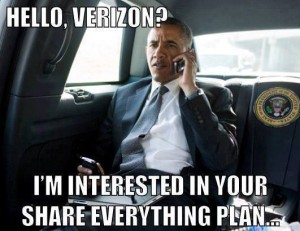 The Los Angeles Times reports that Verizon Wireless will monitor customers’ activities on wireless devices as well as wired or Wi-Fi-connected desktop computers and laptops.
The Los Angeles Times reports that Verizon Wireless will monitor customers’ activities on wireless devices as well as wired or Wi-Fi-connected desktop computers and laptops.
Verizon customers recently began receiving a notice from the company that it is “enhancing” its Relevant Mobile Advertising operations to glean more information from its customers.
Collected data on users’ online activity will then be passed to marketers for targeted advertising.
The telecom giant will automatically download a “cookie,” or tracking software, onto a user’s computer or device without explicit warning when the customer visits the company’s “My Verizon” website to view a bill or watch television programming online, according to Verizon spokeswoman, Debra Lewis.
The cookie will give a data-collection company working with Verizon – though Lewis declined to identify the entity – to monitor the user’s actions online, even after leaving “My Verizon.”
Though Ms. Lewis has incorrectly identified a “cookie” as “software,” it is actually more of a snippet of coding that stays in your browser and relays information of your browsing history back to its source. Normally, a cookie is used to help a shopper or website member by recognizing that person on return visits to a website (such as remembering what was left in a shopping cart from a previous visit). Most people don’t have a problem with this type of cookie, as it feeds information to only the website the user interacts with.
Verizon’s cookie is nefarious.
In Verizon’s use of a cookie, the cookie is being used to track everywhere you go on the Internet. This is a true “tracking cookie.” Tracking cookies and especially third-party tracking cookies, such as Verizon is using, are commonly used as ways to compile long-term records of individuals’ browsing histories. Tracking cookies have angered the public because of privacy concerns.
Verizon is installing these cookies for one reason – money. Leveraging a database of millions of customers shopping habits and interests, and then selling that information to advertisers who target customers through the Verizon phone and Internet network.
This is one of the more outrageous examples of how businesses loudly proclaim their commitment to safeguarding consumers’ privacy while quietly selling us out to the highest bidder.
“The holy grail for profiling people is to follow them from one device to another,” said Paul Stephens, director of policy and advocacy for the Privacy Rights Clearinghouse in San Diego. “We’re going to see more and more of this.”
How to opt-out of the program, though, is up to the customer to figure out, as Verizon’s notice to customers is short on details, according to The Times.
“Some people may want to see advertising that’s more relevant,” Lewis said in denying that Verizon’s move was intrusive.
Yeah, sure they do.
This isn’t the first time Verizon has shared personal information on customers.
Back in the summer of 2013 The US National Security Agency (NSA) and Federal Bureau of Investigation (FBI) had been secretly spying on millions of Verizon wireless customers in the US for at least several months with the knowledge and cooperation of Verizon.
AT&T and T-Mobile told The Times they don’t have similar programs. Sprint did not answer The Time’s request for comment.
If you use Verizon, maybe it’s time to change your service provider.
Disclaimer: On January 4, 2016, the owner of WestEastonPA.com began serving on the West Easton Council following an election. Postings and all content found on this website are the opinions of Matthew A. Dees and may not necessarily represent the opinion of the governing body for The Borough of West Easton.







